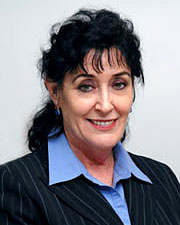
Mya C. Schiess, MD
- Professor
- Director, Movement Disorders & Neurodegenerative Diseases
- Director, Movement Disorders Fellowship Program
- Movement Disorders
Biography
Mya Schiess, MD, professor in the Department of Neurology at McGovern Medical School at The University of Texas Health Science Center at Houston (UTHealth), serves as director of the Movement Disorders & Neurodegenerative Diseases Program and program director of the UTMOVE Movement Disorders Fellowship training program.
Dr. Schiess, who also holds the Adriana Blood Chair in Neurology, sees patients from young adults to seniors. Her goal is to provide the most comprehensive care for her patients and their families by providing the best medical, surgical and physical therapies available. She works with local support groups and therapy providers and tailors her care and management to the needs of the individual, with the goal of restoring or keeping them at their highest level of functioning. Dr. Schiess believes that knowledge is power, and takes the time to educate her patients, their family members and caregivers.
Dr. Schiess is actively involved in clinical and translational research in regenerative neurology with stem cell therapies for Parkinsonian Syndromes and neuromodulation with deep brain stimulation. She is an active member of several professional organizations and serves on the medical advisory board for the Houston Area Parkinson’s Society. Additionally, she has received several awards and honors during her career.
Education
- Medical Degree
- University of New Mexico School of Medicine, Albuquerque, NM
- Residency
- Neurology, University of Texas Southwestern at Dallas, Dallas, TX
Areas of Interest
Clinical Interests
The medical and surgical management of Parkinson’s disease and Parkinsonian syndromes, tremor states, Dystonia, ataxia, and other neurodegenerative diseases.
The medical and surgical management of spasticity
Research Interests
Determine the patho-etiology and pathophysiology for cell death in idiopathic Parkinson’s disease
Develop preclinical biological markers for presymptomatic diagnosis of Parkinson’s disease
Determine the role of intrathecal baclofen therapy in improving functional motor outcomes in hypertonic states